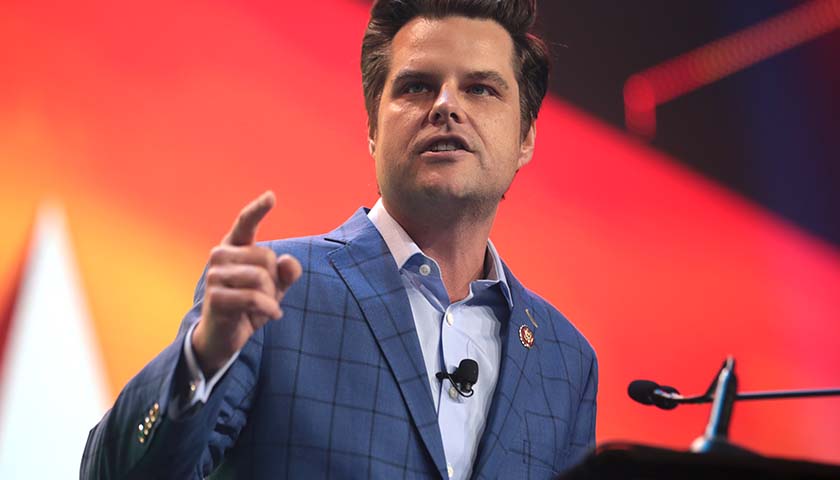by Scott McKay
As a “socially distanced” Thanksgiving nears, and as the worst year of modern American history begins drawing to a close, our readers can be excused for thinking there are very unwelcome developments and needed adjustments extant in our culture and society.
Clearly that’s the case if we’re going to have to spend the next four years with Joe Biden in the White House. That’s a prospect that augurs something really unappetizing.
Namely, that 2021 could very well be a worse year than 2020 has been.
One key reason we’re where we are is that most Americans have allowed social media to have some power over our lives. That should be a good thing. Social media should democratize information, allow us to more easily stay connected with friends and family and stay plugged into the world while keeping our own schedules.
We may be getting some of those things out of Facebook, Twitter, and some of the other Big Tech oligarchs. But what we’re also getting is, frankly, terrible.
It’s beyond argument at this point that Facebook and Twitter have behaved in ways that aren’t just inappropriate but dangerous. Their suppression of news and science on COVID-19, for example, has stifled public discussion. And not in productive ways. And the suppression of valid information affecting the election has been nothing short of atrocious.
The market, which has been attempting to break free of the grasp of Facebook and Twitter for some time, is finally moving. Parler has spent several weeks as one of the hottest apps in the app stores, and MeWe is beginning to move forward as well. Alternative social media channels and platforms are likely to pop up in droves over the next several months to satisfy the demand for something new. Because it’s certainly time, for conservatives at least, to move on from these fascistic, creepy incumbents.
But there’s a reason why those newer platforms haven’t taken off to date, and it’s a bit scary.
For one thing, the Big Tech giants have made a practice of buying up nascent apps before they could emerge as real competitors. That’s an anticompetitive practice that probably should have been looked at in the antitrust arena by now. But for another, those who wouldn’t sell out to Big Tech have found themselves targeted for destruction.
Just look at Gab, which billed itself as a free speech platform, an alternative to the censorship of Facebook and Twitter. That billing meant many of the users setting up shop on that platform embraced “unpopular” views, which shortly got Gab branded as a home for white supremacists, neo-Nazis, and other undesirables. Before long, there were problems with servers, with banking, with listing in app stores.
If you’re running a social media platform, your app’s source code could well be a fatal problem.
Last week Jason Lehr, the founder of a nascent streaming platform called Creado Media — it’s the one actor Nick Searcy is helping to get off the ground — wrote an extremely interesting newsletter on what it takes to get one of these apps off the ground. Here’s what Lehr said:
Since we began this process a few years ago and throughout our research period we have seen many companies rushing to market in our space. Each of these companies have the best of intentions trying to create a solution in this era of censorship and cancel culture. The biggest for these startups is that unless they understand the depths of big tech and have the right team in place to build an infrastructure they will all be reliant on competitor technology and always at risk for being shut down. Amazon AWS, Google Cloud and Microsoft Azure control the market when it comes to hosting. Unfortunately, all run their cloud technology through Chinese data centers….
The hot new commodity launched in December 2018 was the social site Parler. Parler was founded with investment from the Mercer family (large conservative donors) and the Matze’s brothers. A great idea in theory as a competitor to Twitter and Facebook, which quickly had success before tech glitches and a bad user interface made it completely difficult to navigate. Dan Bongino invested a small amount in Parler in September and has become a face for the ownership group now. They are now experiencing a second growth period as conservatives are flocking to it. For the time being it’s an alternative, but they have to fix the user interface and functionality and ultimately address their growth potential. The other company receiving publicity as a replacement for YouTube is Rumble, which Bongino invested in as well.
While you never build anything based on politics or for one focused group of people, true freedom and protection has to be at the core for all of your customers. The bigger problem for both of these companies is that they have built both of their platforms on Amazon AWS infrastructure, which is owned by far-left billionaire Jeff Bezos. In such a polarized landscape where cancel culture and free speech are at a boiling point, both of these companies are reliant on competitor technology and at any moment can have their sites shut down. Or, best case they would have their resources throttled back making their sites impossible to use. So both are not truly “free from censorship” and certainly are not protecting your data. To remove themselves from AWS would require these companies to completely rebuild most of, if not all of their infrastructure.
It is very important to understand the depths of big tech, the monopoly they have created and why they have been able to control every aspect of content and its delivery.
One of the things Lehr’s company is working on, beyond the creation of a pro-American streaming service that could someday rival Netflix (which is sorely needed), is to build a backbone of infrastructure and source code independent of Amazon, Google, and Microsoft. If Creado is successful and that backbone is available to be contracted out to other apps and services, one could perhaps envision a true First Amendment–friendly internet, something we certainly do not currently have.
When that day comes, a Gab or a Parler will be a true competitor to Facebook. At that point they’ll no longer have a sword of Damocles hanging over their heads.
But there is another problem with social media, or actually a pair of problems, which the next generation of apps ought to address.
First, as covered in the Netflix documentary The Social Dilemma, mentioned in this space some weeks back, you the user are not the customer of these apps, and that’s problematic. In fact, you’re the product. You’re a hen in a hatchery, a cow in a dairy. They want you to reveal your psychographic and demographic profile so they can monetize it with advertisers; you have no other value to them but to be manipulated into clicking on the hypertargeted ads they show you.
When that’s the business model, these people are not your friends. And you shouldn’t be doing business with them.
But there’s a bigger problem with the current social media space, which nobody is likely considering. Namely, that it’s killing the very democratization of information it promised to promote.
Consider the plight of a content creator — an author, a web publisher, a podcaster, a YouTuber — who isn’t tied to the corporate media that does more to pay obeisance to China and stifle innovation and creativity than anything else. Your humble correspondent fits into a couple of those categories, so I know this of which I speak.
As a content creator you’re supposed to build a robust presence on social media. Get yourself a nice blue checkmark. Say interesting things that generate engagement. This will make you an important person and generate a large following for you that you can then use to drive traffic to your website. That’s supposed to make you rich, or at least that’s the elevator speech Big Tech offers to induce content creators to post things that attract and engage users on these platforms and therefore market them for free.
But thanks to Big Tech, and specifically Google, Facebook, and Amazon, who control the digital advertising market, revenues from digital advertising networks to publishers of websites are at all-time lows. So all that traffic you’re working so hard to generate on your site now makes you next to nothing revenue-wise. If you’re a YouTuber, things aren’t much better; those Google ads running inside of the YouTube videos on your computer mostly generate beer money and not all that much more for the independent channels producing them. There’s a reason why the production values for so many independent YouTubers are so basic: there’s no money coming in for anything else.
Worse, the following you’ve built on, say, Facebook no longer works for you. Thanks to changes in its algorithm Facebook actually refuses to show material from your Facebook page to your followers, some of whom you might have spent money with Facebook to attract, without your paying even more to “boost” Facebook posts you make.
They beat you coming and going.
There is a not-small number of independent publishers, not just in the news and politics space but elsewhere as well, who have recognized this reality gives them no future. They’ve quit. That has the perverse effect that while corporate media continues its decline, the independent media that was stealing its market share is fading away just as quickly.
Some of them are trying out things like Substack and Patreon, which run off subscriptions at, essentially, boutique rates. The problem there is as a consumer, do you really want to maintain a dozen or more subscriptions to Patreons and Substacks and others every month?
The new “free speech” platforms don’t really reverse this problem. Parler is certainly a haven for independent publishers, but there really isn’t much on offer in terms of fixing the monetization problem.
And it has to be fixed, or we’re going to lose a lot of independent content creators — who are the people we need if we’re going to break the corporate media’s hold on the culture.
So here’s an idea that I’m going to be working to develop in the next few months: what if there was a platform that had as its main impetus serving as a connector not just between its customers, or users, but between them and those content creators? What if it wasn’t driven by advertising and didn’t steal away the personal information of ordinary folks? What if it was driven by revenue from ridiculously cheap subscriptions and the content creators shared in that revenue with the platform, such that the content creators were incentivized to grow their presence on the platform?
What if independent publishers, podcasters, YouTubers, authors, and others found a friendly marketplace that wanted them to succeed? And what if that marketplace treated the people shelling out a few bucks a month for social media not built on manipulating their consumer patterns as adults?
It seems like an impossible dream at this point, of course. But it isn’t all that far away.
– – –
Scott McKay is publisher of the Hayride, which offers news and commentary on Louisiana and national politics. He’s also a novelist — check out his first book “Animus: A Tale of Ardenia,” available in Kindle and paperback.




